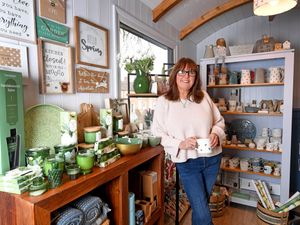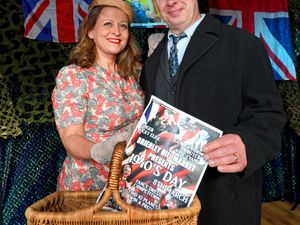Waterway to spend a day! Our day with the lock keepers on Dudley No. 1 Canal in Brierley Hill
Lock keepers have been a fixture on Britain’s canals for hundreds of years and are one of the oldest traditions of the waterways
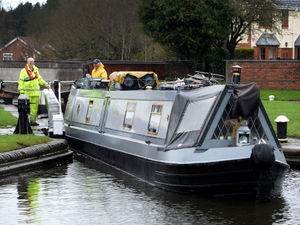
And they are still playing an important role today seeing boats safely through the locks and lending a helping hand where needed.
They are also tasked with preserving the historic waterways for future generations and being a friendly face for all visitors passing through the area.
Waterways charity Canal and River Trust has a team of more than 900 volunteer lock keepers up and down the country.
With more than 32,000 boats using the canals and 3.8 million ‘lockings’ or passages through locks each year, this busy crew are an integral part of the waterways.
Among the 180 in the West Midlands are a team of six at Delph Locks, also known as Delph Nine, on the Dudley No. 1 Canal in Brierley Hill. This forms part of the Stourport Ring, a connected series of canals around Worcestershire, the Black Country and Birmingham.
Due to their name, it would be reasonable for people to expect nine locks to pass through on this stretch but there are only eight, which leaves many boaters scratching their heads.
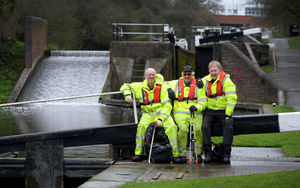
“There were originally nine locks, as the name suggests, but due to mining subsidence 150 years ago, the route had to be diverted. The new route only needed a flight of eight locks.
“At the bottom there is a pub called the Tenth Lock just to add to the confusion. We do get a lot of people saying ‘we thought there were nine but we’ve only counted eight,” says volunteer lock keeper Brian Jones.
For Brian, who began volunteering in March 2014, being part of the team at Delph Locks gets him out in the fresh air, getting exercise and meeting new people.
The retired contracts manager lives a stone’s throw from the locks, “It’s my backyard,” the 72-year-old quips. “I’ve also been interested in canals, rivers and trains so it was a natural progression for me,” he tells us.
The team, who work in pairs, will be found by the canalside on Tuesdays and Thursdays which is when most boaters will reach Brierley Hill if they are following this cruising route.
Locks are needed on stretches of water of different levels.
Each one is basically a chamber that holds water and accommodates the boats to either lower or raise them. Moving down the flight, the boat will move into the chamber and the gate will be shut behind it.
Water is then let out of the other end until the same level is reached. The gate is then opened so the boat can proceed to the lower level.
When travelling up the flight, the top paddle is opened to let water into the lock, which raises the boat so it can move onto the higher level.
One of the team members ready to offer assistance is computer studies teacher Terry Cox who began operating the locks in September 2014 after being encouraging to sign up by his friend and fellow volunteer Brian.
“It’s very different from being in the classroom and I enjoy the variety. Most people who volunteer have come from offices, factories or other jobs that are quite repetitive. But there is such a variety of jobs I never know what I’m going to face when I come here – it’s so different from teaching,” says the 71-year-old.
Terry says it can take half an hour to go through the flight of locks so their help is always appreciated by passing visitors and at busy times of the year they might get two boats an hour needing a hand.
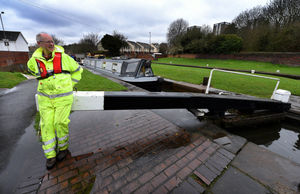
“Everybody always says thank you. We always have a chat with them about where they are from and where they are going. Sometimes we are there just to offer advice especially when there are boaters with children as they like them to start learning the skills from an early age so we stand back and we are there if we are needed.
“We get a lot of single-handed boaters and they are always grateful for the help because they would have to keep tying up the boat while they prepared the next lock so it takes much longer,” he explains.
Another important role of a volunteer lock keeper is helping to keep the waterway clear by removing rubbish from the canal as well as the towpath.
“Shopping trolleys are a biggest bugbear. When we first started we were pulling three or four out a week but we are seeing them less often now. Littering has also improved, we would fill two bags just walking the length of the locks but now it’s down to about half a bag. I think people can see the effort we are putting in and some are maybe thinking twice.
“We do still get an awful lot of plastic rubbish. It’s not biodegradable and we pull out bottles that must have been in the water for years.
“We have to get the rubbish out because we don’t want it obstructing the boats and we are also doing our bit for the environment,” explains Terry, who lives in Oldswinford.
Out of nesting season, the team also cuts back vegetation along the towpath and will paint the locks if they need sprucing up.
Brian says: “I enjoy being able to see the fruits of our labour whether it’s helping someone up the locks or picking up rubbish. It’s nice to know we’ve made a difference.”
The Canal and River Trust has vacancies for volunteer lock keepers at Wolverhampton, Delph Locks, The Bratch in Wombourne and Stourport. To find out more see www.canalrivertrust.org.uk/volunteer

